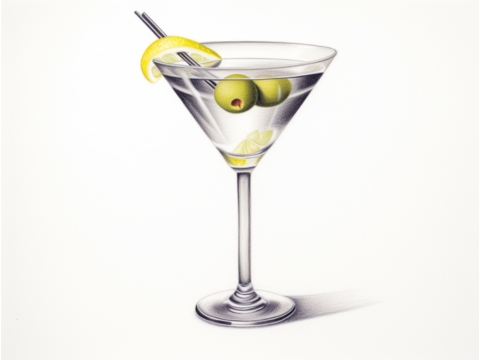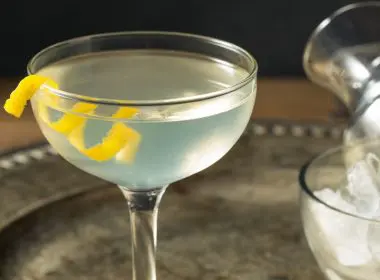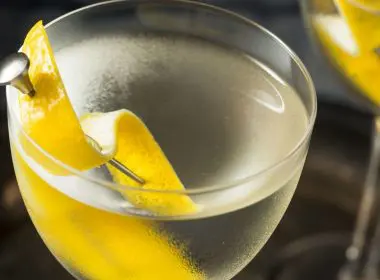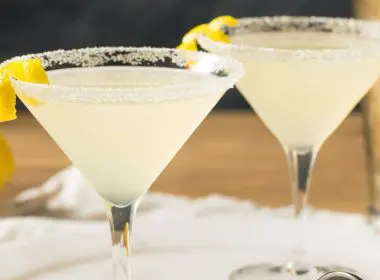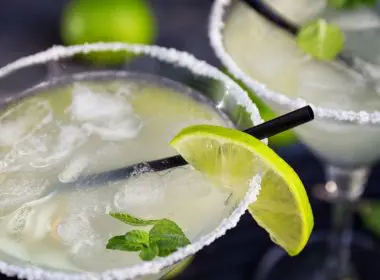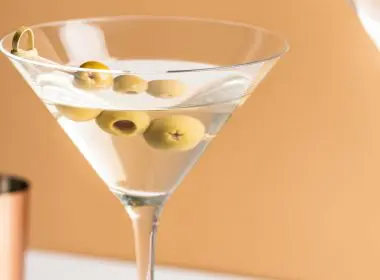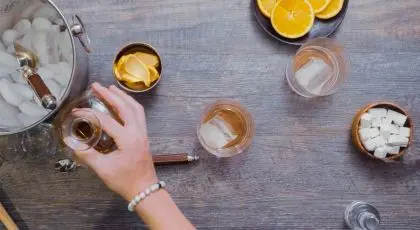The origins of the Martini cocktail
This is one of the most popular drinks in the world, so it makes sense that there are tons of stories about where the Martini originated. You can choose which one you like best:
- The Martinez Special. A famous story goes that the Martini was invented in Martinez, California, during the 1800s Gold Rush. Ostensibly, a miner struck gold (literally) and went to a bar to celebrate his good fortune. With no champagne in stock, the bartender made do with what he had to create a celebratory cocktail.
- It’s all in the name. This popular theory is also worth mentioning. According to some, the drink was named after the brand of sweet vermouth used in the initial recipe. The name stuck, and all its variations became famous across the globe.
- Knickerbocker glory. Many New Yorkers insist that the Martini was created by Martini di Amara di Taggia, a bartender at Knickerbocker Hotel. According to legend, he invented this iconic drink in 1911 to honour America’s first-ever billionaire, John B Rockefeller. This is our favourite theory because we can totally picture the popularity of this drink spreading across the city as businessmen started enjoying the famous 3-Martini-lunch.
How to make the classic Martini cocktail?
If you don’t know what a Martini drink is made up of, you’ll probably be surprised by its simplicity. With only two key ingredients—gin or vodka and dry vermouth, making a Martini is all about using the best spirits and getting the ratios right.
The important question: shaken or stirred?
James Bond famously asked for his Martini to be “shaken, not stirred”, however, Martini experts generally disagree with this. This is because shaking the drink causes more of the ice to chip off and melt, diluting and altering the temperature of your Martini. Stirring Martinis gently with a cocktail stirrer results in a silkier mouthfeel and stops them from becoming cloudy.
Which is better, gin or vodka?
Martini purists argue that a drink can only be called a real Martini if it’s made with gin and that anything else simply doesn’t count. But as time has gone by, you’re now just as likely to see modern martinis made with vodka, fruit or sparkling wine-based varieties like the Champagne Martini.
What is dry Vermouth and why is it important in a Martini?
As one of the only two ingredients of a classic Martini, dry vermouth plays a very important role in this iconic recipe. Typically clear or pale yellow in colour, it is classed as a light and airy fortified wine. The best type to use has well-integrated floral, fruity, and herbal notes. This is particularly true of Cinzano Vermouth Bianco, which pairs beautifully with the botanical flavours of gin.
Sweet vermouth, on the other hand, has a richer infusion of herbs and spices, which gives it a deeper amber colour. It imparts hearty notes of spices like vanilla, caramel, and darker fruits, that underpin classic cocktails like the Negroni and Manhattan.
More about vermouth: Everything You Need to Know About Vermouth
4 Amazing Martini variations to try
The Classic Martini may seem like a deceptively simple combination of gin and dry vermouth, but there are many ways to shake up this particular combo. Here are a few variations to try if you’re on a mission to pinpoint your favourite:
- Dry Martini: The Classic Martini features a ratio of 6 parts gin to 1 part vermouth. Some people prefer even less vermouth, using just a splash or rinse of the fortified wine to make a Dry Martini.
- Wet Martini: On the flip side, a Wet Martini is more vermouth-heavy, often with a ratio of about 4 parts gin to 1 part vermouth. The exact ratio will vary based on individual taste preferences.
- Dirty Martini: A Dirty Martini takes the core ingredients of a Classic Martini – dry gin and vermouth – and adds one (rather unexpected) ingredient: olive brine. By adding a dash of olive brine, the drink is given a uniquely salty and savoury flavour that many people love.
- Perfect Martini: The Perfect Martini is made in the same way as the classic, but instead of only using dry vermouth, the recipe calls for equal parts dry and sweet vermouth. This gives the drink a sweeter finish.
More martinis this way: 22 Types of Martinis You Should Know
Lemon twist or olives?
Lemon peel is a classic choice as a Martini garnish. It adds a bright and citrussy zing to the drink that makes the rest of the flavours pop. A lemon twist is also simple to make.
- Start by washing a lemon and patting it dry.
- Use a sharp knife or a vegetable peeler to cut a strip of lemon peel, avoiding as much of the white pith as possible.
- Twist the strip of lemon peel to form a curl or twist shape, and give it a squeeze over the cocktail glass before you drop it in the drink to release the aromatic essential oils.
If you prefer a more savoury flavour profile, olives are a great garnish choice. For a classic Martini, the most common type of olive used is the pitted green olive. The brininess and saltiness of the olive add a complementary flavour to the drink and helps to balance the taste of the gin. You can either use whole olives or stuff them with ingredients such as blue cheese or almonds to add an extra pop of flavour.
More garnish ideas: 16 Creative Cocktail Garnish Ideas for Your Next Cocktail Night

